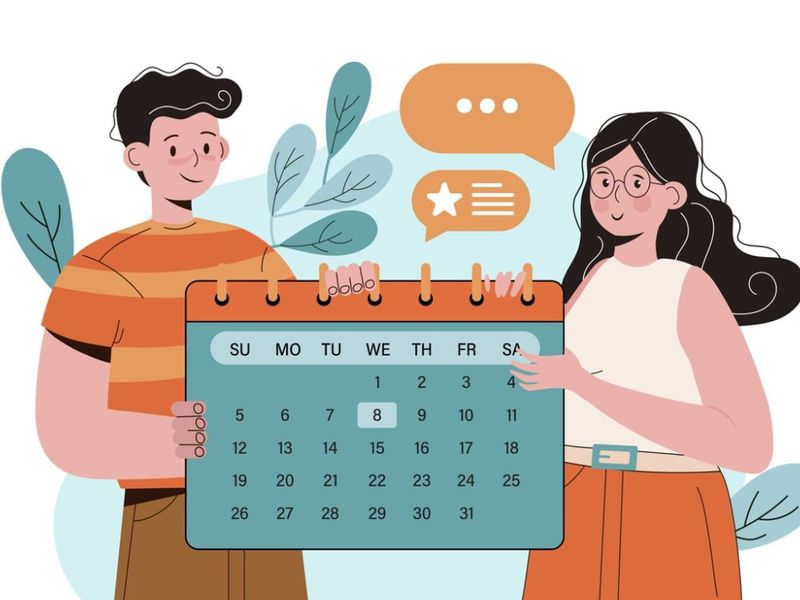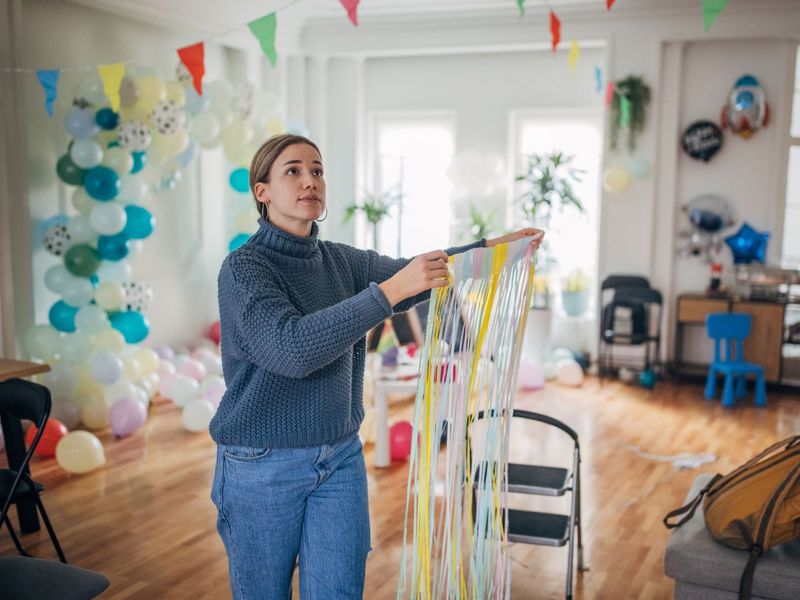Mankeeping can subtly drain the essence of romantic relationships, leaving women emotionally and mentally exhausted. Here are 20 ways this silent burden can erode connection and love.
1. Managing his calendar so he doesn’t forget important dates
In the whirlwind of life, remembering birthdays and anniversaries shouldn’t fall on one person. She finds herself constantly reminding him of dates he should cherish. This mental load becomes a silent strain. A shared calendar could help balance responsibilities.
Yet, the emotional labor often remains hers alone. The lack of shared memory signals a deeper issue. It’s not just about the dates. It’s about showing value for the relationship by remembering. When she takes on this burden, it erodes her joy and connection.
She’s not just managing dates. She’s managing her disappointment. A collaborative effort in remembering important dates can spark the warmth of mutual appreciation.
2. Reminding him about household chores repeatedly
Does it really take repeated reminders to empty the trash? For many, it seems so. Each reminder chips away at patience, turning simple tasks into sources of tension. The expectation is clear, yet the follow-through is lacking. It’s not just the chores themselves.
It’s the lack of initiative that weighs heavily. When reminders become routine, they cultivate resentment. The burden of managing household duties shouldn’t fall on one person. A shared commitment ensures fairness and reduces friction.
This isn’t about nagging. It’s about seeking a partnership built on mutual respect and cooperation. Emotional balance in a relationship thrives on shared responsibilities.
3. Picking up after him like he’s a child
Imagine walking into a room where clothes are strewn haphazardly, and dishes clutter every surface. It’s a scene she knows all too well. Picking up after him becomes a daily routine, much like caring for a child. The act of cleaning isn’t inherently the issue.
It’s the lack of consideration. This dynamic fosters frustration, silently eroding respect. When partnership turns into parenting, love feels like a chore. It’s essential to cultivate an environment of mutual responsibility.
Cleaning becomes a collective task, not a one-sided duty. It’s about building a home together. Respecting the shared space strengthens the fabric of their relationship.
4. Keeping mental tabs on everything he loses
“Have you seen my keys?” is a question met with a familiar sigh. She’s the keeper of all things lost. Her mind, a catalog of his misplaced items. This invisible task drains more than time. It drains emotional energy. The constant search disrupts peace, turning tranquility into chaos.
It’s a burden silently carried. While love means helping, it shouldn’t mean overshadowing one’s own needs. Encouraging self-reliance fosters growth and independence.
It’s not just about finding keys. It’s about finding balance. When he learns to manage his possessions, it frees her mental space. Their connection becomes lighter, unburdened by unnecessary stress.
5. Being his only source of emotional support
Providing emotional support is a cornerstone of partnership. Yet, when one becomes the sole pillar, strain emerges. She finds herself constantly absorbing his stress, offering comfort without reciprocation. This one-sided emotional labor becomes heavy.
It’s not about refusing support. It’s about balance. Encouraging him to seek multiple avenues of emotional relief strengthens the relationship. When both partners share emotional burdens, they grow together. The relationship thrives on mutual empathy.
Encouraging him to build a supportive network outside the relationship alleviates pressure. He becomes more resilient. The relationship transforms from a solo act into a harmonious duet, filled with understanding.
6. Planning every holiday and family gathering alone
The joy of holidays often lies in shared moments and collective effort. Yet, she finds herself orchestrating every detail alone. From meals to seating arrangements, the responsibility is hers. This imbalance shadows the festivities.
Planning becomes a source of stress, not joy. A unified approach to holiday preparations fosters connection. It’s about creating memories together. When he steps into the planning process, it lightens her load. His involvement turns obligation into celebration.
Shared responsibilities ignite excitement and anticipation. The holiday spirit flourishes. It’s not just about the event itself. It’s about nurturing a tradition of togetherness and love.
7. Making excuses for his poor behavior to others
“He didn’t mean it,” becomes a constant refrain. Making excuses for his behavior becomes second nature. She smooths over social missteps, shielding him from consequences. This protective act chips away at her own integrity.
It’s draining to constantly justify actions that shouldn’t need excuses. A relationship thrives on accountability. Encouraging him to own his behavior fosters maturity and respect. It’s not about casting blame. It’s about nurturing growth. When both take responsibility for actions, trust deepens.
The relationship becomes a safe space for honesty. She deserves a partnership rooted in authenticity, not pretenses. Together, they can build a foundation of respect.
8. Handling all the grocery shopping and meal planning
Walking through aisles, list in hand, she navigates the world of grocery shopping alone. Meal planning becomes her solo endeavor. It’s not just about the food. It’s about managing nourishment for the household. The burden becomes heavy when unshared.
A joint effort in meal planning and shopping transforms a task into a bonding experience. It’s not merely about cooking. It’s about sharing the pleasure of providing together. When both contribute, meals become a celebration of partnership.
Understanding each other’s preferences and dietary needs fosters deeper connection. The kitchen turns into a space of collaboration, filled with warmth and joy.
9. Covering for his forgetfulness with kids or friends
“He forgot the gift,” she explains, hiding her disappointment. Covering for his lapses becomes routine. It’s not just about the forgotten items. It’s about shielding loved ones from disappointment. The emotional toll builds quietly.
Encouraging him to remember commitments fosters responsibility. It’s about acknowledging the importance of others. The simple act of remembering reassures loved ones of their value. When he steps up, it lightens her emotional load.
Together, they create a circle of trust and reliability. She deserves a partnership where responsibilities are shared, not assumed. By nurturing each other’s strengths, the relationship blossoms into a supportive haven.
10. Monitoring his health appointments and meds
Health should be a shared focus, not a one-person task. Yet, she finds herself managing appointments and medications. Her role shifts from partner to caretaker. It’s not just about the logistics. It’s about the emotional weight of responsibility.
Encouraging self-management fosters independence and mutual respect. It’s not about neglect. It’s about partnership. When he takes ownership of his health, it demonstrates care for himself and the relationship.
Collaborative health management transforms stress into shared well-being. They support each other in achieving wellness goals. Together, they build a foundation of health-conscious living, enhancing their bond with vitality and energy.
11. Taking the blame for his bad moods
“It’s my fault,” becomes an unwelcome mantra. She finds herself shouldering blame for his moods, smoothing over rough edges. It’s not just about taking responsibility. It’s about absorbing negativity. This dynamic diminishes her self-worth.
Encouraging emotional expression without blame cultivates trust. It’s about validating feelings, not assigning fault. A relationship grounded in empathy fosters understanding. When both partners own their emotions, they create a safe space for vulnerability.
She deserves a partnership where emotions are shared, not imposed. By embracing emotional honesty, they nurture a connection filled with compassion and acceptance.
12. Constantly guiding him on social etiquette
Navigating social situations can be tricky. Yet, she finds herself constantly guiding him on what’s appropriate. It’s not just about etiquette. It’s about understanding social dynamics. This role becomes exhausting over time.
Encouraging self-awareness fosters social confidence. It’s not about criticism. It’s about growth. When he learns to navigate social settings independently, it enhances their social experiences. Together, they become a confident pair, enjoying interactions without apprehension.
She deserves a partnership where social grace is mutual, not one-sided. By supporting each other, they create an environment of ease and enjoyment, making social gatherings a delight.
13. Remembering everyone’s birthdays for him
“Did you get them a card?” she asks, already knowing the answer. Remembering birthdays for him becomes an expected duty. It’s not just about dates. It’s about acknowledging relationships. This task becomes burdensome when unreciprocated.
Encouraging him to engage in remembering fosters appreciation. It’s about valuing connections. When both partners share this responsibility, it strengthens their social bonds. Together, they create a network of love and companionship.
She deserves a partnership where effort is mutual, not assumed. By embracing the joy of giving, they nurture relationships filled with warmth and gratitude, celebrating the people they cherish.
14. Acting as his personal cheerleader all the time
“You’ve got this!” becomes her constant refrain. Acting as his personal cheerleader, she boosts his confidence. Yet, the role becomes exhausting without reciprocation. It’s not just about encouragement. It’s about mutual support.
Encouraging self-belief fosters resilience. It’s about creating a partnership of empowerment. When both partners cheer for each other, they build a foundation of strength and encouragement. She deserves a partnership where support is shared, not expected.
By nurturing each other’s dreams, they cultivate a relationship filled with ambition and achievement, cheering each other on through life’s challenges and triumphs.
15. Shouldering the emotional weight of his career stress
Work stress is a common challenge, yet she finds herself absorbing it all. She becomes his emotional outlet, carrying his burden. It’s not just about listening. It’s about emotional labor. Encouraging open dialogue fosters understanding.
It’s about sharing, not imposing. When both partners discuss career stresses, they create a supportive space for growth. She deserves a partnership where emotional burdens are shared, not assumed.
By nurturing open communication, they build a relationship filled with empathy and resilience. Together, they navigate the challenges of work life, supporting each other with understanding and compassion.
16. Anticipating his needs before he asks
Anticipating needs sounds considerate, yet it becomes draining when one-sided. She finds herself preemptively addressing his needs. It’s not just about kindness. It’s about emotional labor. Encouraging communication fosters independence.
It’s about expressing, not assuming. When both partners communicate needs openly, they create a space of mutual respect. She deserves a partnership where understanding is mutual, not anticipated.
By embracing open dialogue, they nurture a relationship filled with empathy and respect, supporting each other’s needs and desires. Together, they build a foundation of communication and love, fostering a harmonious connection.
17. Correcting him quietly to avoid embarrassment
Mistakes happen, yet she finds herself quietly correcting him to shield from embarrassment. It’s not just about saving face. It’s about protecting. This role becomes a silent burden. Encouraging self-awareness fosters confidence. It’s about learning, not hiding.
When both partners embrace mistakes, they create a space of growth and understanding. She deserves a partnership where confidence is mutual, not protected.
By supporting each other in learning, they nurture a relationship filled with acceptance and growth, embracing imperfections with love. Together, they build a foundation of trust and support, navigating life’s challenges with grace.
18. Balancing finances while he stays disengaged
Managing money should be a shared responsibility, yet she finds herself balancing finances alone. It’s not just about numbers. It’s about partnership. This task becomes draining when unreciprocated. Encouraging financial engagement fosters respect.
It’s about sharing, not assuming. When both partners manage finances together, they create a foundation of trust and security. She deserves a partnership where financial responsibility is mutual, not burdened.
By embracing teamwork, they nurture a relationship filled with stability and understanding, planning for a future together with confidence and clarity. Together, they build a foundation of financial harmony.
19. Avoiding conflict by doing tasks yourself
In the interest of peace, she takes on tasks to avoid conflict. It’s not just about completing chores. It’s about preserving harmony. Yet, this avoidance erodes communication. Encouraging open dialogue fosters understanding.
It’s about expressing, not avoiding. When both partners discuss responsibilities, they create a space of mutual respect. She deserves a partnership where tasks are shared, not assumed.
By embracing open communication, they nurture a relationship filled with empathy and collaboration, supporting each other’s strengths and weaknesses. Together, they build a foundation of trust and partnership, navigating life’s challenges with unity and understanding.
20. Feeling more like a parent than a partner
Partnership should be equal, yet she feels like a parent managing everything. It’s not just about responsibilities. It’s about roles. This dynamic becomes draining over time. Encouraging shared responsibility fosters equality.
It’s about partnership, not parenting. When both partners contribute equally, they create a space of mutual respect. She deserves a partnership where roles are balanced, not burdened.
By embracing teamwork, they nurture a relationship filled with equality and collaboration, supporting each other in life’s journey. Together, they build a foundation of partnership and love, navigating challenges with unity and understanding.





















